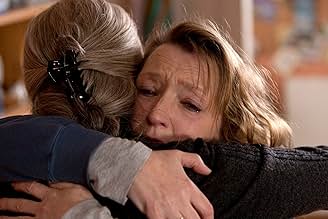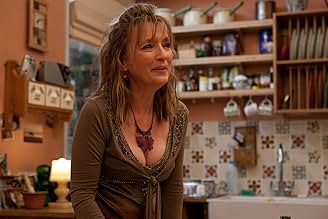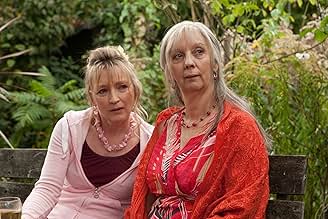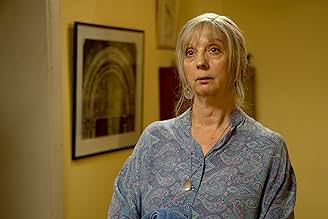IMDb रेटिंग
7.4/10
32 हज़ार
आपकी रेटिंग
एक खुशहाल शादीशुदा जोड़े के जीवन के चार मौसम और परिवार और दोस्तों के साथ उनके संबंधों को दर्शाया गया है.एक खुशहाल शादीशुदा जोड़े के जीवन के चार मौसम और परिवार और दोस्तों के साथ उनके संबंधों को दर्शाया गया है.एक खुशहाल शादीशुदा जोड़े के जीवन के चार मौसम और परिवार और दोस्तों के साथ उनके संबंधों को दर्शाया गया है.
- 1 ऑस्कर के लिए नामांकित
- 23 जीत और कुल 57 नामांकन
फ़ीचर्ड समीक्षाएं
Mike Leigh's latest film Another Year follows the story of a happily married couple approaching their retirement years. Their warm relationship offers them security as the the film progresses. Their friends and family, by contrast, all struggle to some extent with unhappiness, and a sense that their best years may be behind them.
The film is a story of ageing; the small events that can make life either comforting or unbearable; and the refuge that companionship can offer.
Rut Sheen's role as Gerri is superb. Her open, welcoming face invites her friend and colleague Mary (played by Lesley Manville) to open up to her about her drunken fears of where her life is leading. Jim Broadbent's Tom is charming and self-effacing, confident in his own happiness yet nonplussed at the failure of his friend Ken – Peter Wight – to come to terms with growing old.
The film dwells on the small, predominantly non-verbal signals that reveal emotional and social insecurity. Leigh's direction reminds us that the sharpest insights into character lie in moments where we think we at our most concealed. Faces betray what we wish were kept private – at moments where verbal communication fails, physical expression lights up hidden fears, passions, failings and desires.
Leigh treats all his characters with a certain dignity – whilst there are moments where we are encouraged to laugh at their social inadequacies, for the most part we suffer along with them, knowing that their experiences are all too near reality to take lightly. We encourage Tom and Gerri to keep supporting their despairing friends, yet knowing at the same time that their married happiness can only serve to mock their friends' lonely lives further. The four strictly partitioned seasons of the film point towards a growing anxiety that it may in fact be too late for these lost characters. The cyclical nature of the structure suggests that there is no real remedy for those left unloved and lonely at the film's conclusion.
From the opening scene, where a woman silently struggles to recollect the happiest moment in her life, to the point when the dialogue slowly fades away to leave Mary isolated and forlorn, we cannot help but be both enchanted and dismayed by the emotional honesty of Mike Leigh's characters. This is what sets out the director as a truly gifted artist – his ability to heighten the routine into the dramatic; and to make the trivial, truly tragic.
The film is a story of ageing; the small events that can make life either comforting or unbearable; and the refuge that companionship can offer.
Rut Sheen's role as Gerri is superb. Her open, welcoming face invites her friend and colleague Mary (played by Lesley Manville) to open up to her about her drunken fears of where her life is leading. Jim Broadbent's Tom is charming and self-effacing, confident in his own happiness yet nonplussed at the failure of his friend Ken – Peter Wight – to come to terms with growing old.
The film dwells on the small, predominantly non-verbal signals that reveal emotional and social insecurity. Leigh's direction reminds us that the sharpest insights into character lie in moments where we think we at our most concealed. Faces betray what we wish were kept private – at moments where verbal communication fails, physical expression lights up hidden fears, passions, failings and desires.
Leigh treats all his characters with a certain dignity – whilst there are moments where we are encouraged to laugh at their social inadequacies, for the most part we suffer along with them, knowing that their experiences are all too near reality to take lightly. We encourage Tom and Gerri to keep supporting their despairing friends, yet knowing at the same time that their married happiness can only serve to mock their friends' lonely lives further. The four strictly partitioned seasons of the film point towards a growing anxiety that it may in fact be too late for these lost characters. The cyclical nature of the structure suggests that there is no real remedy for those left unloved and lonely at the film's conclusion.
From the opening scene, where a woman silently struggles to recollect the happiest moment in her life, to the point when the dialogue slowly fades away to leave Mary isolated and forlorn, we cannot help but be both enchanted and dismayed by the emotional honesty of Mike Leigh's characters. This is what sets out the director as a truly gifted artist – his ability to heighten the routine into the dramatic; and to make the trivial, truly tragic.
Another Year is the kind of film an actor wishes they had been in and any director wishes they had made. Mike Leigh's skillful directing is at its peak. Long, lingering shots of the characters angst (which normally frustrate the audience) are achieved in an effortless way. The acting is so flawless that it is difficult to find fault. The story is simple and meandering...but it works, and works incredibly well. Another Year will not be to the taste of the young kick-cutting action packed generation. It requires a mature audience or an audience that have at least pondered about what their life would be like after their forties.
This will gain nominations and should win Oscars.
This will gain nominations and should win Oscars.
Mike Leighs wonderfully ironic yet sweet look at life takes a little twist in this super ensemble movie which centers around Tom and Gerri and shows us these characters mainly as reflected by their friends and kin. What makes the twist is something written in a different review and which is apparently a Continental European viewpoint if I must believe Mr. Leigh. The minor flaw of this film is that Tom and Gerri hardly develop and if they do, it really is downwards as - when you leave the theatre - you are left with some questions as to whether they really are as warm and supportive as they appear prima facie. Why are all their friends alcoholic losers? And why are they so supportive, yet so aloof? We found a few scenes that show how Tom and Gerri feel about Mary (a shoe-in for any award because of the slightly over-the-top, nail biter performance by Lesley Manville). Their friends really make them feel better about themselves. Whatever may be of this Continental take, it is a tremendously enjoyable movie, as always.
A strange and sad little film beautifully acted by its ensemble cast. Lesley Manville's agonised performance as Mary, aching with envy at the solidity and comfort of her best friend's solid marriage, must be a shoo-in for awards next year, but Ruth Sheen is also 100% believable as the endlessly patient, almost 'saintly' Gerri. Jim Broadbent's Tom teeters on the verge of hamminess, allowing Peter Wight to steal the male acting honours as Ken, another lonely and alcoholic divorcée.
After a sad Spring and a prickly Summer, Autumn brings romance to Tom and Gerri's bachelor son and Winter brings a funeral (not the one we've been dreading). Anchored by the couple's devotion to their allotment, Mike Leigh gives us a film about the seasons in our lives as well as in our vegetable patches. In life, as in the garden, some things flourish and blossom while others wither and decay.
Often humorous but mostly achingly sad, this is a very fine film about the Ordinary Lives of Ordinary People. Not to be missed.
After a sad Spring and a prickly Summer, Autumn brings romance to Tom and Gerri's bachelor son and Winter brings a funeral (not the one we've been dreading). Anchored by the couple's devotion to their allotment, Mike Leigh gives us a film about the seasons in our lives as well as in our vegetable patches. In life, as in the garden, some things flourish and blossom while others wither and decay.
Often humorous but mostly achingly sad, this is a very fine film about the Ordinary Lives of Ordinary People. Not to be missed.
This is a big movie tackling big themes, and may, like Happy-Go-Lucky (Mike Leigh's previous film) prove extremely Marmitish. The latter comment may prove hard to understand if you're not British, and that's just like the film (Marmite is a British spread made from yeast extract with a love-it-or-hate-it umami/savoury/salty flavour). Another Year deals with a particularly British form of social breakdown and emotional constipation.
In Britain, from the 40s to the 70s there was widespread use of an exam system called the 11+. Up until the age of 11-12 students were schooled together, after that point, students considered to have more potential by the standards of the 11+ examinations were streamed separately in Grammar Schools, prepared for success, whilst those below the boundary line were sent to Secondary Modern Schools where the focus was much more on practical education (bricklaying, "home economics", woodwork, etc). The legacy of this system has been huge social resentment. There is a feeling in Another Year that the system is back, in the form of university education. With the UK attempting to educate 50% of the secondary school student population to university level, a socially engineered bifurcation to haves and have-nots is being created once again.
All of the characters in the film are from working class backgrounds and yet the fortunes that life has graced them with are distinctly uneven, they have gone in different directions, absent any idea of a shared experience that may have been the rock of previous generations of Britons. Graduates Tom and Gerri (pun intended) have fulfilling careers, heartfelt love for one another, high incomes, and have had the opportunity to travel widely. Tom's brother and Gerri's friend Mary are aging and alone, undereducated, lacking in the kind of accomplishments that are social currency, living with hurt, and in Mary's case, desperation. The message is not all one way, old friend of the family Ken is also a graduate and yet has not managed to find a place in life either.
Scenes in the movie almost exclusively concern Tom and Gerri's catering to this group of friends and family. They deal with the misfortunes of this circle with a mixture of humour, irony, good cooking and alcohol, but mostly conceal their compassion and are helpless onlookers.
The mating game is key here, the unwedded 40+s exist in a state of unsalved distress, futureless, scrapped. Even 30-year-old Joe, functional, graduate, well-employed and witty has struggled to find someone to be with. A notable absence in the movie is a sense of solidarity, community, public events, shared lives and shared values. There's an illiquidity in the relationships marketplace, a lack of feeling and connection, all leading to a general anomie and social constipation.
However painful the lives of Ken and Mary are, the film gives occasional glimpses of far more infernal lives, lower circles of hell where dissatisfaction has paralysed characters with rage or utter resignation. Anything more than a glimpse would have made the film unwatchable.
Gone are the days when WWII veterans would whimper their way through night-times of post-traumatic hallucination for forty years without mentioning it to a soul, however the British "stiff upper lip" still remains as a guiding principle in this movie. There is still very much the assumption that one should keep one's private hell to oneself, or else outsource emotion to a therapist.
What may be controversial in the film is the way you look at how Tom and Gerri treat Mary. A German lady in the audience voiced her opinion to Mike Leigh that the way they treated her was to look down on her, and that she felt this was inappropriate. Mike Leigh responded that the lady felt like this because she was a German and Germans did not understand irony. Maybe I suffer from the same problem because I for one felt that Mary was treated as little more than a baby, and with a certain hauteur, arms-length love. I think people who are lonely need to feel useful. Mary for example was never allowed to help with anything, though this does not excuse her, at times, appalling behaviour (depression makes people selfish, however I feel it necessary to point out as well that someone who is drowning in a river and calling for a life ring, is also being "selfish" in the same way, and I think metaphorically the position is very similar).
Dour joyless watching, maybe one for the Cabinet to watch, after the example of the film La Haine, which concentrated on French malaise and was screened in front of the French cabinet at the instigation of Prime Minister Alain Juppé.
In Britain, from the 40s to the 70s there was widespread use of an exam system called the 11+. Up until the age of 11-12 students were schooled together, after that point, students considered to have more potential by the standards of the 11+ examinations were streamed separately in Grammar Schools, prepared for success, whilst those below the boundary line were sent to Secondary Modern Schools where the focus was much more on practical education (bricklaying, "home economics", woodwork, etc). The legacy of this system has been huge social resentment. There is a feeling in Another Year that the system is back, in the form of university education. With the UK attempting to educate 50% of the secondary school student population to university level, a socially engineered bifurcation to haves and have-nots is being created once again.
All of the characters in the film are from working class backgrounds and yet the fortunes that life has graced them with are distinctly uneven, they have gone in different directions, absent any idea of a shared experience that may have been the rock of previous generations of Britons. Graduates Tom and Gerri (pun intended) have fulfilling careers, heartfelt love for one another, high incomes, and have had the opportunity to travel widely. Tom's brother and Gerri's friend Mary are aging and alone, undereducated, lacking in the kind of accomplishments that are social currency, living with hurt, and in Mary's case, desperation. The message is not all one way, old friend of the family Ken is also a graduate and yet has not managed to find a place in life either.
Scenes in the movie almost exclusively concern Tom and Gerri's catering to this group of friends and family. They deal with the misfortunes of this circle with a mixture of humour, irony, good cooking and alcohol, but mostly conceal their compassion and are helpless onlookers.
The mating game is key here, the unwedded 40+s exist in a state of unsalved distress, futureless, scrapped. Even 30-year-old Joe, functional, graduate, well-employed and witty has struggled to find someone to be with. A notable absence in the movie is a sense of solidarity, community, public events, shared lives and shared values. There's an illiquidity in the relationships marketplace, a lack of feeling and connection, all leading to a general anomie and social constipation.
However painful the lives of Ken and Mary are, the film gives occasional glimpses of far more infernal lives, lower circles of hell where dissatisfaction has paralysed characters with rage or utter resignation. Anything more than a glimpse would have made the film unwatchable.
Gone are the days when WWII veterans would whimper their way through night-times of post-traumatic hallucination for forty years without mentioning it to a soul, however the British "stiff upper lip" still remains as a guiding principle in this movie. There is still very much the assumption that one should keep one's private hell to oneself, or else outsource emotion to a therapist.
What may be controversial in the film is the way you look at how Tom and Gerri treat Mary. A German lady in the audience voiced her opinion to Mike Leigh that the way they treated her was to look down on her, and that she felt this was inappropriate. Mike Leigh responded that the lady felt like this because she was a German and Germans did not understand irony. Maybe I suffer from the same problem because I for one felt that Mary was treated as little more than a baby, and with a certain hauteur, arms-length love. I think people who are lonely need to feel useful. Mary for example was never allowed to help with anything, though this does not excuse her, at times, appalling behaviour (depression makes people selfish, however I feel it necessary to point out as well that someone who is drowning in a river and calling for a life ring, is also being "selfish" in the same way, and I think metaphorically the position is very similar).
Dour joyless watching, maybe one for the Cabinet to watch, after the example of the film La Haine, which concentrated on French malaise and was screened in front of the French cabinet at the instigation of Prime Minister Alain Juppé.
क्या आपको पता है
- ट्रिवियाTo simulate the four seasons of a year, cinematographer Dick Pope used four different film stocks, and much attention was paid to details in the props so that the passage of time would appear believable.
- गूफ़One of Mary's outlays on her troublesome car was for a new carburettor, but the vehicle in the film had fuel injection.
- कनेक्शनFeatured in At the Movies: Cannes Film Festival 2010 (2010)
- साउंडट्रैकAll Shook Up
Written by Elvis Presley & Otis Blackwell
Used by kind permission of Carlin Music Corp & EMI Publishing
टॉप पसंद
रेटिंग देने के लिए साइन-इन करें और वैयक्तिकृत सुझावों के लिए वॉचलिस्ट करें
- How long is Another Year?Alexa द्वारा संचालित
विवरण
- रिलीज़ की तारीख़
- कंट्री ऑफ़ ओरिजिन
- आधिकारिक साइटें
- भाषा
- इस रूप में भी जाना जाता है
- Thêm Một Năm Nữa
- फ़िल्माने की जगहें
- उत्पादन कंपनियां
- IMDbPro पर और कंपनी क्रेडिट देखें
बॉक्स ऑफ़िस
- बजट
- $80,00,000(अनुमानित)
- US और कनाडा में सकल
- $32,05,706
- US और कनाडा में पहले सप्ताह में कुल कमाई
- $1,11,869
- 2 जन॰ 2011
- दुनिया भर में सकल
- $1,97,22,766
- चलने की अवधि2 घंटे 9 मिनट
- रंग
- ध्वनि मिश्रण
- पक्ष अनुपात
- 2.35 : 1
इस पेज में योगदान दें
किसी बदलाव का सुझाव दें या अनुपलब्ध कॉन्टेंट जोड़ें










































